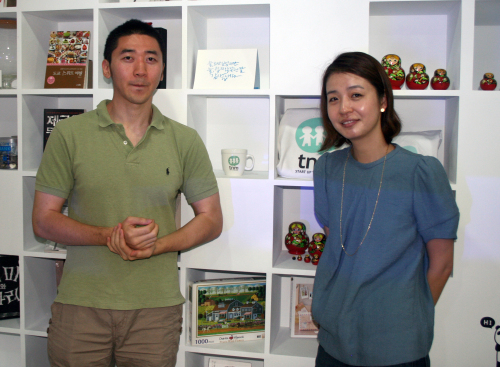Korea’s English-language blogs have increasingly been a useful source of information for expats, providing information that is difficult to find elsewhere and a sense of community.
But the vast majority of online content made by Koreans remains inaccessible to English speakers.
That gave Nanoomi’s founding editor Cynthia Yoo the idea of setting up a network of bloggers in which Korea’s bloggers could provide a bigger picture for English speakers.
“There’s great content in Korea, great content about Korea, but it’s just not getting through,” she said. “Often there’s a language barrier but also a cultural barrier and there’s tech barriers too: Any content that’s produced in Naver stays in Naver.”
“But as we were doing this I was getting to meet a lot of great bloggers like Robert Koehler of the Marmot’s Hole, Eat Your Kimchi, ZenKimchi, Jennifer Flinn, all these great folks. And we discovered that there’s this huge wonderful community of English-language bloggers here and abroad.”
But the vast majority of online content made by Koreans remains inaccessible to English speakers.
That gave Nanoomi’s founding editor Cynthia Yoo the idea of setting up a network of bloggers in which Korea’s bloggers could provide a bigger picture for English speakers.
“There’s great content in Korea, great content about Korea, but it’s just not getting through,” she said. “Often there’s a language barrier but also a cultural barrier and there’s tech barriers too: Any content that’s produced in Naver stays in Naver.”
“But as we were doing this I was getting to meet a lot of great bloggers like Robert Koehler of the Marmot’s Hole, Eat Your Kimchi, ZenKimchi, Jennifer Flinn, all these great folks. And we discovered that there’s this huge wonderful community of English-language bloggers here and abroad.”

Nanoomi is the English-language arm of TNM, which provides services for selected Korean power bloggers, such as syndication, advertising support and content sales.
“Individual bloggers, even if they’re power bloggers, they don’t have the time, or they can’t go out and get advertisers,” Yoo explains.
“We’re in the stage of one person media. But you just can’t do things on your own, even if your content is great and you have a great audience as well. So what we’re trying to do is provide a network and projects that allow people to come together, collaborate and cooperate in order to produce sustainable media.”
Jin Seung-hun, content producer for Venture Square, a TNM project that supports tech venture firms, says that one way this can produce results is through collaborative mobile phone applications.
“So if it’s a summer vacation application, there are more than 10 bloggers gathered together just to make one application,” he said.
TNM also plans to set up a site where users can buy, sell and trade content in an eBay-like format, which Yoo hopes will also be a conduit for collaborative work.
Nanoomi also has a podcast in which several of its bloggers take part.
“One blogger, sometimes they just don’t have the time to produce 100 podcasts. But if you divide that among seven, eight, even 10 bloggers that’s totally doable.”
This is a big part of what that is setting up collaborative projects that bloggers would struggle to do otherwise.
“Even ZenKimchi. Even though he’s popular, there’s a limit to what he can do on his own,” said Yoo.
“Charles Montgomery of KTLIT is heading a book project right now. I introduced an online book platform to him, and we’re working on an online book at first that is later going to be published in English and Korean in a paper form too.”
Nanoomi provides similar advice and support to TNM, and uses its network of bloggers to find quick answers to problems, as well as drawing on the company’s legal and technical resources.
“In the beginning we had a lot of questions about copyright and media laws that affect bloggers,” said Yoo.
“We created a guideline sheet on that. Last year we even held a workshop with Creative Commons Korea to answer some of those questions.”
Yoo said that Nanoomi looked for quality content, which often meant it could be quite specific, but also for bloggers that can build communities by themselves.
“Someone like ZenKimchi also has multiple guest bloggers. And if someone like ZenKimchi wants to organize a food tour, he can easily get people to be interested and to contribute and participate in that context.”
Yoo admitted there were some areas that Nanoomi had been unable to cover. She pointed to a dearth of sports bloggers as an example. She also said that language barriers limited the current affairs offerings.
“A lot of bloggers are more on the opinion side when it comes to hard news, but there aren’t very many current affairs bloggers,” she said.
“There’s a problem of a kind of echo-chamber effect. I think someone like Matt from Popular Gusts of Feeling breaks that because he can research in Korean, he gets this amazing content. Even though he focuses on specific areas, he gets really deep into those areas.”
Yoo said the company had hired someone who would focus on translation of Korean content ― both directly and by using collaborative online translation ― to get more current affairs content. This could attract more people to the Nanoomi site, which at the moment has mostly content that can be seen on their partners’ blogs.
“Some of our popular bloggers do get more traffic. And I guess that’s what we’re going to work on with our new guy. By translating and highlighting some of the interesting Korean content. No-one’s really doing that among the English-language bloggers, because they just don’t read Korean. So what he’s going to work on is highlighting popular, interesting, quality Korean blog content.”
Many of Nanoomi’s bloggers are critical of things in Korea ― whether it’s complaints about trade barriers on the Marmot’s Hole or Eat Your Kimchi pooh-poohing the mangled English of K-pop.
Despite this, Yoo said she had never received negative feedback.
“It’s like any good content. If it’s well-researched and fairly covered, then I think people are appreciative of that. But if you get opinionated shouting going on by either side ― whether it’s a Korean blogger or by an English-language blogger ― who would like that? No one likes that.”
In fact, Yoo says that Nanoomi and TNM encourage well researched criticism.
“Bloggers can only grow their audience when their audience knows that they’re being up and up on them. This whole marketing scandal with Baby Rose, I think it’s proof that the readership won’t stand for people not being straight with them,” she said, referring to a scandal in which a Korean blogger took thousands of dollars worth of commission on sales of a sterilizer she recommended, without her readers knowing. The device was found to breach safety standards.
Yoo said that marketing was fine, as long as bloggers were transparent about their dealings.
“To be honest there’s a lot of similar things going on in media circles as well. Bloggers have been very critical of that culture. This Baby Rose scandal highlights that similar issues can affect bloggers as well.”
The affair was beyond the scale of Nanoomi’s bloggers, but was a reminder of ethics: ZenKimchi wrote to clarify his position on accepting free gifts.
In addition to the book and podcast, Nanoomi is planning a project with Yonhap News in which they create a platform where bloggers can use Yonhap articles and graphics and use it to create new content.
“The Korean public is really internet savvy and now they’re pretty mobile savvy too. But a lot of Korean traditional media ― legacy media ― they don’t provide interesting ways for citizens to consume and share the news content,” said Yoo.
“This project will give Yonhap the chance to do that.”
By Paul Kerry (paulkerry@heraldcorp.com)


![[AtoZ into Korean mind] Humor in Korea: Navigating the line between what's funny and not](http://res.heraldm.com/phpwas/restmb_idxmake.php?idx=644&simg=/content/image/2024/04/22/20240422050642_0.jpg&u=)


![[Exclusive] Korean military set to ban iPhones over 'security' concerns](http://res.heraldm.com/phpwas/restmb_idxmake.php?idx=644&simg=/content/image/2024/04/23/20240423050599_0.jpg&u=20240423183955)
![[Herald Interview] Why Toss invited hackers to penetrate its system](http://res.heraldm.com/phpwas/restmb_idxmake.php?idx=644&simg=/content/image/2024/04/22/20240422050569_0.jpg&u=20240422150649)
![[Graphic News] 77% of young Koreans still financially dependent](http://res.heraldm.com/phpwas/restmb_idxmake.php?idx=644&simg=/content/image/2024/04/22/20240422050762_0.gif&u=)







![[Exclusive] Korean military to ban iPhones over security issues](http://res.heraldm.com/phpwas/restmb_idxmake.php?idx=652&simg=/content/image/2024/04/23/20240423050599_0.jpg&u=20240423183955)



![[Today’s K-pop] Ateez confirms US tour details](http://res.heraldm.com/phpwas/restmb_idxmake.php?idx=642&simg=/content/image/2024/04/23/20240423050700_0.jpg&u=)